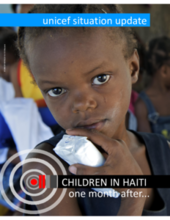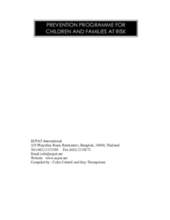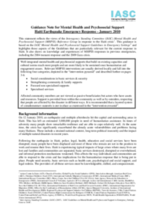Demographic Data
|
Sources: World Bank, UNICEF, UNDP HDR 2015, DHS 2013 |
Displaying 13341 - 13350 of 14555
Comprehensive update on the situation and responses underway following January’s Earthquake in Haiti. Reports on the full spectrum of the response including health, nutrition, education, early childhood development and the scale-up of protection mechanisms to prevent exploitation and abuse of children.
Guidance on setting up prevention programs to reduce child protection risks to children and young people, and in particular to prevent commercial sexual exploitation.
Presentation by Linda Richter at the CCABA & IAS for the Meeting on Children and Especially Marginalized Populations on the 10-11th February 2010 in Geneva.
Key messages and guidance for action
Provides guidance to organisations working in Haiti about how they can most appropriately communicate with communities, their own personnel and the media. The Guidance Note focuses mainly on the acute phase of the response (including early recovery) and provides basic guidance for action.
La Recommandation CM/Rec(2010)2 du Conseil de l'Europe relative à la désinstitutionalisation des enfants handicapés et leur vie au sein de la collectivité appelle les Etats membres à prendre toutes les mesures législatives, administratives et autres afin de remplacer la prise en charge institutionnelle par des services de proximité dans un délai raisonnable et dans le cadre d’une démarche globale.
Provides a broad range of dynamic group exercises on preventing, identifying, and responding to child protection by non-specialists.
Regulations and tools designed to create the basis for reforming welfare institutions for the safe and appropriate administration of alternative care.
Comprehensive manual on the theory and process of deinstitutionalization based on the experiences of childcare professionals across the European region.
Member agencies of the Disasters Emergency Committee are calling for international focus to remain on reuniting children who have lost their families during the earthquake in Haiti rather than adopting them out of the country.







